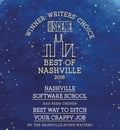From Learning to Code to Learning to Code with an AI Assistant
When Generative AI tools first made headlines, our instructional team dove in to understand their impact. As lead instructor Steve Brownlee explains, the team's thinking has evolved significantly—from initial caution to intentional, multi-phased integration. The first question wasn't "Will this replace developers?" but "How can this help people learn better?"
In this episode of Stories from the Hackery, Steve and John Wark, NSS founder & CEO, reveal the intentional, step-by-step approach NSS has taken to integrating AI into our full stack software development bootcamp.
AI as a Personal Tutor, Not a Code Generator
When students first enter any of our bootcamps, our guidance on AI is clear: do not use it to generate code. Using AI to write code you don't understand is like trying to use a calculator without knowing basic arithmetic, It might give you an answer, but you won't know if it's right or why.
Instead, we start by coaching students to use AI as a personalized learning assistant.
- Stuck on a concept? Ask an AI to explain JavaScript functions "like I'm a beginner."
- Need to check your understanding? Ask it to become a quizzer and test you on a topic.
- Want to organize your thoughts? We introduce tools like Google's NotebookLM, which allows students to upload all their notes and lectures, creating a personal, contextual knowledge base they can talk to.
This approach helps students build their own understanding and personalize their own learning environment.
From Building Sample Data to Reverse Engineering with LLMs
Once students have spent several weeks building foundational coding skills in our software development bootcamp, we introduce code generation. It starts with small, tedious tasks, like generating sample JSON data for a database as they start to learn full stack development. But the real shift happens in the reverse engineering workshop. After a cohort completes a major group project, we challenge them to use an LLM to build the exact same thing.
This exercise is powerful because the students have just spent weeks mastering the logic of their application. They know exactly how it's supposed to work.
"Get the pattern down in your brain," Steve explains. "Start to build up those mental schemas first by writing the code yourself... build up the schemas first and that actually allows you to build better prompts."
This workshop teaches two critical skills:
- Context Engineering: Students learn that to get good code out, you must provide high-quality, detailed context in.
- Code Review: They immediately see where the AI-generated code is "garbage" or deviates from their own, working solution.
By the end of the bootcamp, students are using AI to complete specific features in their final group project—not as a magic wand, but as a professional tool to assist them.
This phased approach throughout their time at NSS, ensures our graduates enter the job market with the strong, foundational problem-solving and coding skills employers require, plus the skill of using AI responsibly.
Beyond the Bootcamp: Using Agentic AI as a "Coding Intern"
We're also rolling out new continuing education courses, like Agentic AI for Developers, for our grads and other working professionals. This course teaches developers how to use AI as a "coding intern" to accelerate their workflow.
The course focuses on:
- Long-Term Context: How to use tools like memory banks and context databases so the AI learns your project's architecture, naming conventions, and database patterns.
- Effective Prompting: Moving from simple questions to "context engineering", where you provide the AI with all the information it needs to write code that fits your existing project.
- Review and Refinement: How to review the AI's work, debug it, and have "refinement conversations" to train the tool on what you want it to do .
The goal is to accelerate your workflow, allowing you to ask your "intern" things like, build a new endpoint for deleting a product, knowing it will follow the patterns you've already established.
The Next Frontier: AI Engineering
Looking ahead, this is all part of a new field emerging in the industry: AI Engineering. This isn't just about using AI to write code; it's about building applications that have generative AI capabilities built into them. As John mentions in the podcast, this could be anything from embedding a smart chatbot in a customer service app to building complex agentic applications that can automate entire workflows.
AI is creating a massive shift, but the tech industry has always been about change. That's why NSS has always focused on teaching you to discover how you learn best. These are just the newest tools in the toolbox. NSS can help you build the strong, foundational skills you need to use these tools and confidently start your tech career.
Want to hear the full conversation? Listen on YouTube, Soundcloud, or wherever you like to listen to podcasts.
Ready to build your own foundational software development skills?
Check out our Full-Stack Software Development bootcamps.







